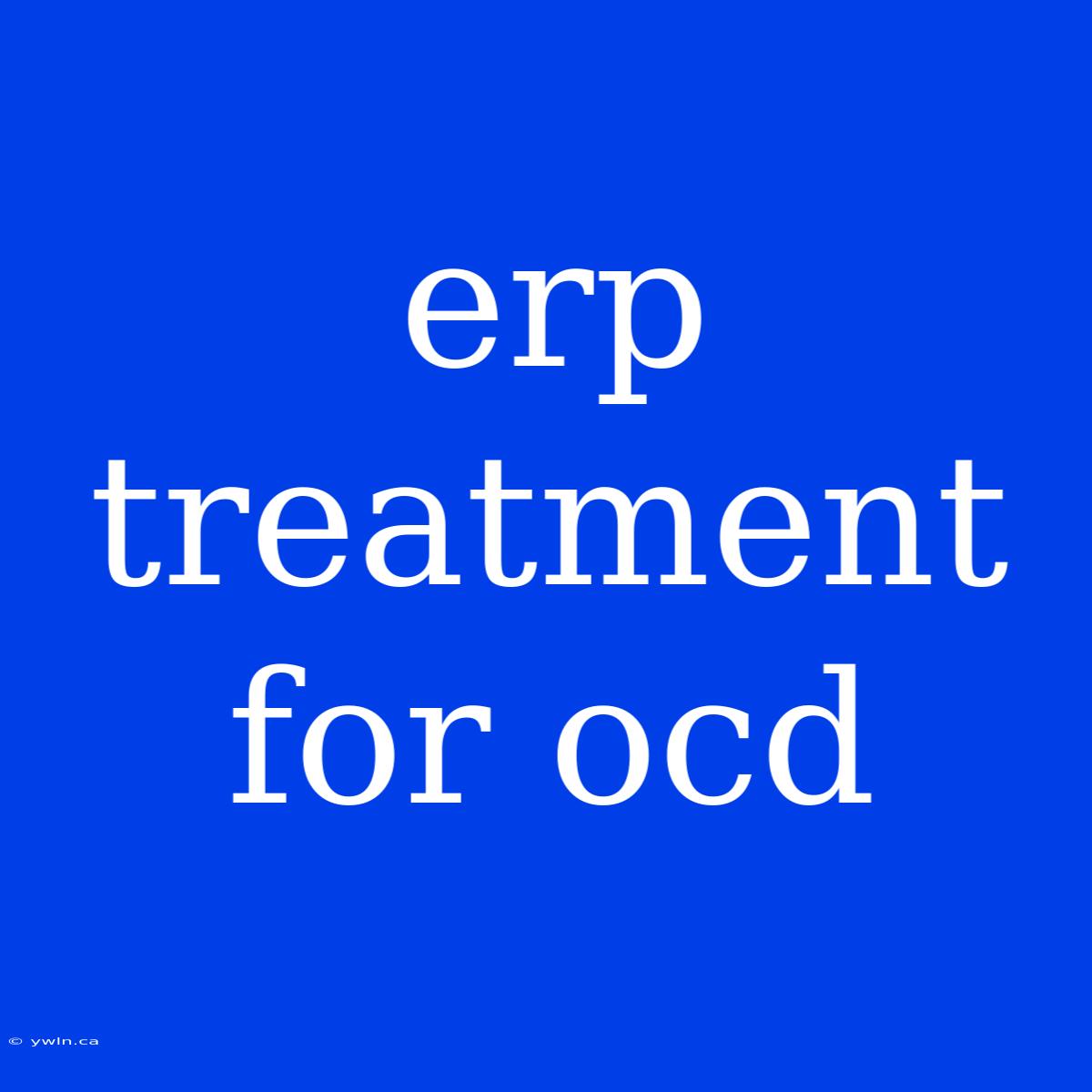ERP Treatment for OCD: Unlocking the Power of Exposure and Response Prevention
Can ERP treatment help you overcome OCD? ERP therapy is a highly effective treatment for Obsessive-Compulsive Disorder (OCD). Editor Note: This article delves into the effectiveness of ERP therapy for OCD, explaining its principles and benefits. Understanding this treatment can be crucial for individuals seeking to manage and overcome OCD.
Analysis: This article aims to provide a clear and comprehensive understanding of ERP therapy for OCD. We analyzed research, expert opinions, and real-life experiences to create a guide that empowers individuals seeking to understand and benefit from this treatment.
Key Takeaways of ERP Treatment
| Takeaway | Description |
|---|---|
| Proven Effectiveness | ERP is a highly effective treatment for OCD, with significant symptom reduction. |
| Focus on Behavioral Change | It focuses on changing behavior patterns associated with OCD. |
| Gradual Exposure to Fears | It involves gradual exposure to triggers, helping individuals overcome anxiety. |
| Preventing Compulsive Behaviors | It encourages resisting compulsive behaviors, breaking the cycle of anxiety. |
| Individualized Treatment Plans | Therapists tailor treatment plans to the specific needs and fears of each person. |
| Collaboration Between Therapist and Client | It emphasizes a strong therapeutic partnership for successful treatment. |
ERP Therapy: A Closer Look
ERP therapy is a type of cognitive-behavioral therapy (CBT) that targets the core of OCD: the cycle of obsessions and compulsions. It involves two key components:
Exposure:
- Highlighting the Importance: This involves gradually exposing individuals to their fears and anxieties, often in a controlled and safe environment.
- Key Aspects:
- Gradual Introduction: Exposure is introduced gradually, starting with milder triggers and progressing to more intense ones.
- Controlled Environment: Exposures often occur in a controlled setting with the therapist's guidance.
- Trigger Identification: The therapist helps identify specific triggers that provoke obsessions and anxieties.
- Discussion: The therapist guides the individual through exposure exercises, addressing anxiety and helping them manage discomfort. They also teach coping mechanisms to manage anxiety during exposures.
Response Prevention:
- Setting the Context: This involves resisting the urge to perform compulsions in response to obsessions.
- Facets:
- Breaking the Cycle: Preventing compulsions helps break the cycle of anxiety and reinforces the realization that compulsions are not necessary.
- Managing Anxiety: The therapist teaches strategies to manage anxiety without resorting to compulsions.
- Cognitive Restructuring: It involves identifying and challenging negative thoughts associated with obsessions.
- Summary: Response prevention is vital in ERP as it teaches individuals that they can tolerate anxiety without performing compulsions. It allows them to experience the decrease in anxiety naturally without resorting to rituals.
ERP Therapy for Specific OCD Types
ERP therapy can be adapted to address specific types of OCD, including:
- Contamination OCD: Exposure might involve touching objects that trigger anxiety, while response prevention involves resisting the urge to wash excessively.
- Harm OCD: Exposure could involve imagining or visualizing scenarios that evoke harm-related obsessions, while response prevention involves refraining from compulsive actions like checking or reassurance seeking.
- Symmetry OCD: Exposure might involve intentionally creating asymmetry in objects or environments, while response prevention involves resisting the urge to fix or rearrange things to achieve perfect symmetry.
Benefits of ERP Therapy
- Reduced Anxiety: ERP helps individuals gradually reduce their anxiety and distress levels.
- Improved Quality of Life: By breaking the cycle of obsessions and compulsions, ERP leads to an improved overall quality of life.
- Increased Control: ERP empowers individuals to gain control over their intrusive thoughts and behaviors.
- Long-Term Recovery: With consistent effort and therapy, ERP can contribute to long-term recovery from OCD.
FAQ
Q: How long does ERP treatment take?
A: The duration of ERP therapy can vary depending on individual needs and the severity of OCD. It generally takes several months of regular sessions to see significant progress.
Q: Is ERP therapy painful?
A: While ERP therapy involves facing anxieties, it is not intended to be painful. The therapist carefully guides the individual through exposure, ensuring their safety and comfort.
Q: Can ERP be combined with medication?
A: ERP can often be combined with medication, especially when anxiety levels are very high. Medication can help manage symptoms while ERP works to address the underlying behavioral patterns.
Q: Is ERP therapy effective for everyone with OCD?
A: While ERP is highly effective for many people with OCD, it may not be the best fit for everyone. In some cases, other therapies or medication may be more appropriate. It is crucial to consult with a mental health professional to determine the most suitable treatment approach.
Tips for ERP Therapy
- Find a qualified therapist: Seek a therapist with expertise in ERP therapy for OCD.
- Be patient and consistent: ERP requires effort and commitment. Stick with the treatment plan and don't give up easily.
- Practice exposure and response prevention daily: Regular practice helps strengthen the benefits of ERP.
- Seek support from loved ones: Share your experience with trusted individuals and seek their support.
- Celebrate your progress: Acknowledge and celebrate your successes along the way, no matter how small they seem.
Summary of ERP Treatment for OCD
ERP therapy is a powerful and effective treatment for OCD. It involves gradually exposing individuals to their fears and anxieties while preventing compulsive behaviors. By addressing the core of the disorder, ERP empowers individuals to reduce anxiety, improve their quality of life, and gain control over their thoughts and behaviors.
Closing Message: By embracing ERP therapy, individuals with OCD can embark on a journey towards healing and recovery, unlocking a life free from the grip of intrusive thoughts and compulsive behaviors. Remember, it is possible to manage and overcome OCD with the right support and commitment.

